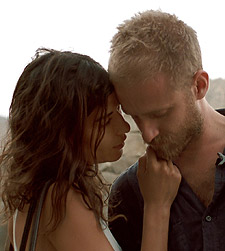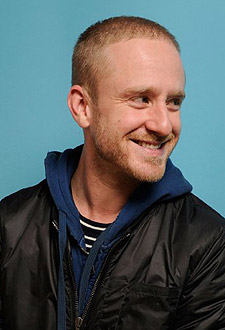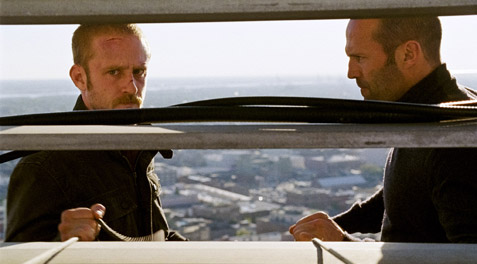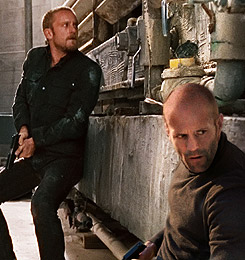
Interview Date: 01/21/2011
Run Date: 01/26/2011
Interviews Home / Movies Home / Bullz-Eye Home
A lot of actors -- including a lot of really good ones -- play characters who seem to enjoy putting on a show in their personal lives. Ben Foster has made a career of playing people who often seem to hate the thought of being noticed. A method actor who's been praised for his thoroughly professional attitude, Ben Foster projects an odd sort of vulnerability. Comparisons are always a trap, but it's hard not to think a little bit of a young Sean Penn or maybe Montgomery Clift. He certainly has that kind of intensity.
If you don't know Foster offhand, there's a good chance you'll remember him as the bone-chilling western psychopath, Charlie Prince, in James Mangold's update of "3:10 to Yuma." Other key roles include a turn as a soldier dealing with wartime trauma in the justly acclaimed but under-seen, "The Messenger," and as a seriously tweaked, seriously angry criminal druggie in "Alpha Dog." That's not all: he stretched his wings superheroically as the highflying Angel in 2006's "X-Men: Last Stand," was "the Stranger" in "30 Days of Night," and has done some high-end television comedy, with his CV also including two appearances each on "My Name is Earl" and the legendary "Freaks and Geeks."
Foster’s latest role adds yet another tortured and angry soul to his lists of credits. In director Simon West's action-heavy take on 1972's "The Mechanic," Foster plays the estranged son of a formerly wealthy, recently deceased crook (Donald Sutherland) who finds himself being mentored by a supercool assassin, played by Jason Statham. Main problem: his new mentor killed his dad. The role gives Foster the chance to combine his emotional commitment with some new skills in the ways of hairbreadth escapes, beating people up, and making things go "BOOM!”
In person, Foster shares many of the mannerisms of his onscreen characters, but with a lot less angst and a lot more low-key good humor. Even so, facing a roomful of journalists can be a challenge, especially when the 10+ assembled writers include two obstreperous Europeans. Foster held up well, though it wasn't super easy for the rest of us to get in a word edgewise. The blunter and less pleasant of the tables' two dominant voices started things off.
Journalist: What brought you in to such a movie? I guess you’re not there for the script, right? You’re in the movie for what, the action, for the fun?
Ben Foster: Everybody likes going to a movie and occasionally watching shit blow up.
Journalist: That is fair. But when you read the script, did you say, “This will be fun after what I’ve been doing”?
BF: Yeah, it’s a break; it’s something different. You know, I was raised on “Die Hard.” You know, me and my brother would be rolling around in the basement, shooting fake guns and getting to do it on a larger level -- it’s fun, man.
Journalist: Was it fun to shoot, or was it scary?
BF: Because it was different, it was fun. The stunts, when you get injured or not, that’s a part of the game. There are very few jobs that allow you to fall down thirty stories from a wire. They say, "Okay, well, this is your job today, you fall." You’re [thinking], "I hate heights," but you’re doing it for the film and you fall. And here’s a gun, you’ve got to kill all of these people, and you’ve got to jump through a fire ball. That’s fun, and there’s nothing wrong with having fun.
Journalist: And getting paid for it.
BF: Yeah. Hey, everybody’s got rent.
Journalist: So how do you prepare for something like this?
BF: We had a great, great stunt crew...When you’re with people who enjoy what they do, it makes your life a little easier. For instance, the fight with the big fella [actor Jeff Chase], we were working on that and trying to define what are [my character's] skills. There’s not a lot of time for character development. There’s some montage sequences showing some gun porn, and then he’s ready to kill people. (Laughs) So working with [the crew] to find out what is [my character in terms of fighting style]. A karate expert? Is it Krav Maga? Is it street fighting? It’s learning the dance. So that’s the kind of prep you do for a picture like this. It’s much more athletic than anything.
Journalist: So you have a new movie at Sundance?
BF: Yeah.
Journalist: Can you tell us something? Because Sundance is just at the door. [Translation: "Sundance is just about here."]
BF: This is true. Yeah, it’s a little different.
Journalist: I ask for that reason.
Journalist: Which one is it?
BF: It’s called “Here.” We shot it for $1.5 million in Armenia. It’s about an American map maker. He meets an Armenian ex-pat still photographer. It’s a romance road movie. We just traveled through the country, went village to village.
Journalist: Which kind of character is yours?
 BF: Braden King is the director. He directed a documentary before this called “Dutch Harbor: Where the Sea Breaks Its Back." I hate to call him just a naturalist, but it’s the love of the environment; it’s the love of getting lost; it’s the love of pushing yourself to an edge of places you don’t know. So these are people who are running from their own lives, who intersect, fall in love, and have to separate again.
BF: Braden King is the director. He directed a documentary before this called “Dutch Harbor: Where the Sea Breaks Its Back." I hate to call him just a naturalist, but it’s the love of the environment; it’s the love of getting lost; it’s the love of pushing yourself to an edge of places you don’t know. So these are people who are running from their own lives, who intersect, fall in love, and have to separate again.
Journalist: Does it get into the politics of Armenia and all of that?
BF: No. You sense it with some of the non-actors who will discuss small elements, but mostly it’s about food, drink, culture, people coming together, intersecting as though on a map.
Journalist: Who is the actress?
BF: It’s Lubna. She was in….God, there was a beautiful film she was in…
Journalist: Okay, I will find. She is Armenian or…?
BF: No, she’s French, but she did an amazing Armenian accent.
Journalist: We will find [her].
BF: I don’t even know what movie we’re talking about. I just came from New Orleans and working.
[NOTE: She is Belgium-born Lubna Azabal, best known for her role in the award-winning and somewhat controversial Palestinian film from 2006, "Paradise Now."]
Journalist: Do you go from “The Mechanic” to “Here”?
BF: I finished “Here,” and, you know, you’re traveling through villages with a very small crew. From there, I went to New Orleans to shoot “The Mechanic,” so it was very…
Journalist: That’s why I’m asking you the question. Did you have time to adjust, or were you just like, “Okay, now I’m at the Four Seasons doing a movie”?
BF: It’s a gas. Anybody who complains about this job is full of shit. When you’re lucky enough to work, no matter where they send you, you go. And you’re going to be meeting different people and specialists. They're people who have real connections to whatever they’re doing, be it fight choreographers who love fighting, or an Armenian mechanic who just wants to sit and toast to the land. And you don’t know what he’s saying, but you feel him.
Journalist: Do you live in L.A.?
BF: I live in New York.
Journalist: Is it choice to live in New York?
BF: I hope it’s a choice...I did thirteen years here. Now, I split my time between northern California in a trailer and the rest in New York.
Journalist: Wonderful. I live in Northern California, where?
BF: Not far from…it’s where the big trees are.
Journalist: Do you spend a lot of time there?
BF: Yeah, I just spent two weeks living out of my trailer, my brother was in a yurt. It was nice.
Journalist: What drew you to the script for “The Mechanic”?
BF: I hadn’t done anything like that. I was in Armenia when they sent me the script, and you don’t really get very good Internet service. I had really bad food poisoning, everybody was sick. Like, everybody was. The D.P. [director of photography], the director, all of the actors, were throwing up and shitting their brains out. This was very unpleasant at certain moments. So when they said, “Go shoot a movie with Jason,” it sounded so psychotically different than what we were doing that it sounded like a [great idea]. Any time it doesn’t totally make sense, it sounds like the right idea, I guess.
Bullz-Eye: Just last night I watched “The Messenger,” and I noticed that the three movies I know you from best are from that, this, and “3:10 to Yuma." [The characters] are all fairly traumatized in some way -- well, maybe not so much in “3:10,” we don’t really know. Are we going to see you playing more fun, happier characters?
BF: “Here” is pretty gentle. It’s a really gentle, soft love story. It’s a lovely land, you know. But if you have a comedy, let me know.
Journalist: When I mentioned that I was coming here for [to my friends and other writers] I mentioned that you were in it. The consensus, no matter who I talked to, was "I love Ben Foster, where has he been?" Because we haven’t seen you much, and I noticed that you have a bunch of projects coming out. But it’s true, you are an actor that a lot of people love to see.
BF: That’s great to hear.
Journalist: So I guess my question is, is this going to be a good year of seeing a lot more Ben Foster movies?
BF: I took a year off after “The Mechanic,” but, yeah, I’ve been pretty busy. It’s been great, really great. I just produced my first film, called “Rampart,” with Oren Moverman, who wrote and directed “The Messenger.” We started a production company together. This is our first film. It stars Woody Harrelson. I have a small role in it. That should be out probably next October. It’s based on a James Ellroy piece.
Journalist: Is it a book or an original script?
BF: An original script that Oren re-wrote.
Journalist: [Ellroy] wrote only one original script, but you’ve got this, so this is exceptional.
BF: It’s got teeth.
Journalist: And it’s a good cast. I am looking at in on IMDb.
BF: Yeah.
Journalist: Is it located in L.A.?
BF: Yeah. The Rampart scandal, the late nineties.
Journalist: Is it sex scandal? Is it economical scandal?
Journalist: The police were corrupt.
[NOTE: Everyone who lived in Los Angeles during the late 1990s remembers the Rampart scandal, which infected the anti-gang unit in one of the city's toughest precincts and forever ended the once powerful myth of the incorruptible L.A.P.D. Even at the time, it seemed entirely appropriate material for the eccentric and hugely talented crime novelist Ellroy to take on.]
Journalist: How did you get that script?
 BF: Oren wrote it, did the re-write, and then after “The Messenger,” we started this production company together, and that was the first one that went for us. There are a few projects that we’re working on together and we got the financing really fast. Woody was the only man for this role. The work he does in this film is going to knock people out.
BF: Oren wrote it, did the re-write, and then after “The Messenger,” we started this production company together, and that was the first one that went for us. There are a few projects that we’re working on together and we got the financing really fast. Woody was the only man for this role. The work he does in this film is going to knock people out.
Journalist: Did you meet James Ellroy?
BF: Uh huh. "The dog." [Laughter around the table.]
Journalist: Was he speaking about girls?
BF: Yeah. Pussy, cops. [More laughter]
Journalist: He’s always speaking about the women.
BF: He’s fun.
Journalist: Getting back to the fight scene [with the gigantic Jeff Chase] real quick, how much input did you have as far as the choreographer and stuff? Or did you want any?
BF: Well, you’re working with size. So a choreographer can say, "Now you punch him," but I can’t reach. So you’re going to kind of work it out together, and you build it together. The day before we shot the bulk of the fight, I was a little careless and did a stunt that I shouldn’t have done. They asked me not to and I did it, anyway. I tore my right shoulder. You don’t really feel things like that, you just know that something’s bad and you continue shooting. Then, the next day, it’s the bulk of the fight, but I woke up and couldn’t move. I thought I had cracked my collarbone. So they pumped me full of steroids, and then my arm started loosening up. But you panic because you think, well, what’s the game of this kind of movie? Like, what do people come to see? They come to see action. They come to see the big fights. And this is the one thing that I was prepping. I’m right handed and I can’t move my arm. You have to figure out how to do it. We did it left handed. So early in the morning, they pump you full of stuff, the arm gives out. An hour before shooting, the thing goes up and the doctor says "I work for the Saints and I’ve never given anyone this much." Then, the screwdriver goes in this arm and you try to keep your fist tight and you go through walls and you jump on things. And you get your ass kicked and, hopefully, you have a scene that people say, "What just happened?"
BE: Did you see the original film before?
BF: If I haven’t seen something before starting a project that happens to be a remake, I don’t want to watch it. I don’t want to steal, unconsciously or consciously. It’s its own thing.
[NOTE: The next several lines have been heavily edited to avoid a massive spoiler for the ending of "The Mechanic." Even so, if you want to avoid talk about the ending completely, you might consider skipping the next few lines.]
Journalist: At the end...you laugh. What was the motivation behind that?
BF: It means different things to different people. It was a nice little Valentine [Jason Statham's character] gave him.
Journalist: Was he just smiling because life is a mystery?
BF: What did it mean to you?
Journalist: I don’t know. I was thinking.
BF: Good, great, excellent. If you think at all after an action film, if you feel like thinking about it, then maybe we did our job.
Journalist: The dialogue is redeeming in the car, when he knows that you have a gun of your father. And you are crying, but the crying is not so stupid.
BF: Hey, tell the world. I need this kind of help.
Journalist: Have you seen the movie?
BF: Yeah, I did.
Journalist: What did you think?
BF: You know, I was going in with not the highest expectations. I mean only because it’s supposed to serve its purpose. It’s entertainment. I wasn’t going in thinking I was going to hate it. I just thought it was going to be what it was, but I think Simon did a really good job with this. I think Jason does some quiet, internal work which I haven’t seen a lot of him doing before. I really liked him in “The Bank Job.” He cracks me up a lot in “Crank.” He’s his own beast. I think he did some really nice work in this.

Journalist: At the end of the day, what do you think people will come to you for in a movie? Because you are a good actor? Because you can play whatever? What’s the reason? Especially for a project like this one.
BF: I don’t know why they hired me.
Journalist: I’m sure you do.
BF: I’m always surprised. I mean truly, you work and you work and you work, and you don’t work for years or there are slow times. But they called me up and said, "Would you do this?" and I would be an asshole [to say "no"].
Journalist: Did you not have to audition?
BF: I don’t know how you audition for something like this.
Journalist: Are you competitive or, when the work is low, you have some other interests, to travel, to see the world?
BF: I really like making things with people.
Journalist: Can you explain that?
BF: Collaboration. So, is it a writer? Is it a director? Is it another actor? Is it a specialist of some sort? I’m a ninth grade dropout and, if I’m honest with myself, there’s a great insecurity that comes with not having a solid education. I’m constantly in awe of specialists and people who have mastered a craft. I get the gift to be able to spend time with them and ask them questions, it’s a life of being a dilettante.
Journalist: So how do you get along with Jason on this shoot?
 BF: Have you talked with him today?
BF: Have you talked with him today?
Journalists: Not yet.
BF: He’s a funny guy. He’s just got a wicked, wicked sense of humor. And he’s an athlete and it’s a world that I don’t know much about. So I came in with the respect of a genre and an approach to say, how do you make this look good? How do you do this? You know. So we got along well. I mean we laughed more than we didn’t.
Journalist: To start, first, what is with the tattoo on your hand? And second, did you have a good relationship with your father?
BF: Wow! [Foster seems humorously flummoxed by the rather intensely personal question and there is laughter around the table.]
Journalist: The entire movie is based on the relationship with your father.
BF: In my own life?
Journalist: Yeah.
BF: Oh, you’re tough. This [points to tattoo on his hand] is from Armenia.
Journalist: That’s new.
BF: Yeah.
Journalist: What’s it mean?
BF: There was an Armenian grip. He took care of everything. He’s just master of all things. He saved our asses out there. Going village to village, we’re on the Iranian border, and we’re getting in trouble. He handles stuff. His name is Zach. When things would go wrong, when we would lose a location, when the so-called KGB would stop us, he would just say, almost like a Californian, which is bizarre because he'd never been here, he would say [in a California surfer accent] “bro, T.I.A.” I said what? He said “T.I.A -- this is Armenia.” What he meant was "celebrate the good with the bad." So, five of us from the movie kind of lived by that and took it to heart. There was a cab driver that you see in the film and he’s missing fingers from a bomb that went off...The guns have been down for what, fifteen years? He had a little tattoo [on his hand] and he was just kind of driving with his thumb and his knuckles. So five of us at the end of the picture went and just got "T.I.A."
Journalist: Your father?
BF: I just spent two weeks with him up in the trees, with my mother and my brother. We're very blessed to be able to spend time together.
You can follow us on Twitter and Facebook for content updates. Also, sign up for our email list for weekly updates and check us out on Google+ as well.











